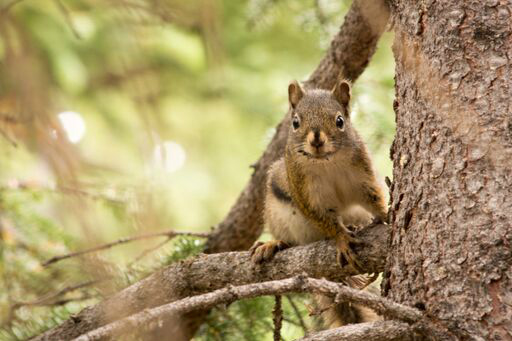
A red squirrel perches on a tree. Findings by UAlberta biologists have found that squirrels that inherit food caches have 50 per cent more offspring than those that have to make it on their own. Photo credit: Amanda Kelley
For red squirrels, the death of a male you've never met could be the key to your survival, according to a new study.
The research indicates that young red squirrels who inherit food caches abandoned by older male squirrels have 50 per cent more offspring than those who do not. The study was conducted in collaboration between the University of Alberta's Department of Biological Sciences and the University of Guelph as part of the Kluane Red Squirrel Project.
"Young squirrels need to move out of 'home' by the autumn of the year in which they are born," said Stan Boutin, professor and co-author on the study with Professor David Coltman. "They can't push adults off of territories and food caches so they have to find places left vacant by the death of an adult. The juveniles then inherit whatever is left in the food store when the adult died."
The bigger the inheritance, the better the chances of survival for both young squirrels and their future families-much like a young couple finding a winning lottery ticket in their new apartment. For squirrels, the best chance of a large inheritance is finding an abandoned food cache from a three to four-year-old male squirrel.
"We think males store more cones than females because they need to access food resources to fuel breeding behaviour during the winter months, when snow prevents foraging off of the food store," said Boutin. Females, on the other hand, need food in the spring after their pups are born-a time when foraging is an easier task and access to a food cache is not as necessary.
Food caches examined in the study contained up to 145,000 spruce cones, with an average of about 20,000 cones. One cache the researchers have followed was active for 31 years, used by 13 different squirrels.
"It is neat to think that the success of an individual can be influenced by individuals they never encounter in their lives," said Boutin. "It's like humans who build up important assets during their lives which then serve to benefit future generations."
The paper, "Indirect effects on fitness between individuals that have never met via an extended phenotype," was published in Ecology Letters (doi: 10.1111/ele.13230).